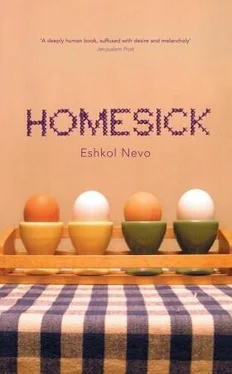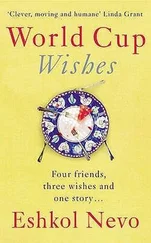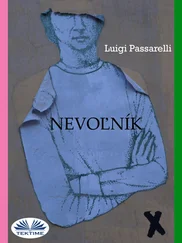Eshkol Nevo - Homesick
Здесь есть возможность читать онлайн «Eshkol Nevo - Homesick» весь текст электронной книги совершенно бесплатно (целиком полную версию без сокращений). В некоторых случаях можно слушать аудио, скачать через торрент в формате fb2 и присутствует краткое содержание. Год выпуска: 0101, ISBN: 0101, Издательство: Random House, Жанр: Современная проза, на английском языке. Описание произведения, (предисловие) а так же отзывы посетителей доступны на портале библиотеки ЛибКат.
- Название:Homesick
- Автор:
- Издательство:Random House
- Жанр:
- Год:0101
- ISBN:9781448180370
- Рейтинг книги:5 / 5. Голосов: 1
-
Избранное:Добавить в избранное
- Отзывы:
-
Ваша оценка:
- 100
- 1
- 2
- 3
- 4
- 5
Homesick: краткое содержание, описание и аннотация
Предлагаем к чтению аннотацию, описание, краткое содержание или предисловие (зависит от того, что написал сам автор книги «Homesick»). Если вы не нашли необходимую информацию о книге — напишите в комментариях, мы постараемся отыскать её.
Homesick
Homesick — читать онлайн бесплатно полную книгу (весь текст) целиком
Ниже представлен текст книги, разбитый по страницам. Система сохранения места последней прочитанной страницы, позволяет с удобством читать онлайн бесплатно книгу «Homesick», без необходимости каждый раз заново искать на чём Вы остановились. Поставьте закладку, и сможете в любой момент перейти на страницу, на которой закончили чтение.
Интервал:
Закладка:
I remember my first snowfall in Jerusalem. I was the new kid in class again, and nobody bothered to tell me about the unwritten rule in that city: if it snows, no one — not pupils and not teachers — goes to school. The guard at the entrance smiled pityingly at me as I went inside. I didn’t understand why. I walked down the empty hallways, expecting that someone would come running towards me with a basketball in his hand, or that a teacher would come walking down the hallway with her high heels clacking on the floor. It wasn’t until I went into the classroom that I figured it out. The chairs were upturned on the desks. Yesterday’s Bible homework assignment was written on the board: describe and explain the fall of King Saul. Outside the window, snowflakes continued to curl around in the air, like my father’s signature. I took my chair off my desk and sat down. Every movement I made — moving my schoolbag, shifting my position in the chair, coughing — was tremendously loud in the empty classroom. I waited a few minutes; maybe one of those nerdy girls who sit in the front row would come. When that didn’t happen, I got up, turned my chair over on the desk as noisily as I could, on purpose, and went home. On the way, I trampled on the lumps of snow that had piled up on the edges of the pavement, my eyes tearful from the wind.
Now, I also feel like turning my chair over on my desk and going. But where? I could always call someone. But who? At this hour, the world is playing musical chairs and I’m the only one left standing. Noa’s unreachable, running around between Bezalel and the café. David’s up to his bald head with rehearsals for Licorice’s first show at the Pargod. He usually calls me between one and two in the morning, whining about how much he misses Michal in a voice hoarse from singing. I calm him down, remind him of her bad qualities (she’d better not go back to him, or else I’m in deep shit) and send him back to the rehearsal. And crazy Modi is trekking around the world. Man, I could really do with a tennis game with him now. One or two sets. A backhand smash on the line. An easy, well-placed volley that he can’t get to, and then we’d sit in the pub, sweating and thirsty, drinking and laughing, laughing and drinking. But he’s so far away now, my best friend. His letters get more and more funnysophical, filled with an intoxicating sense of freedom, and cut off. Very cut off.
Which leaves me every day with the voices of Moshe and Sima arguing on the other side of the wall.
There’s something embarrassing about this vocal voyeurism, so the minute they start, I cover the water-heater hole and turn on the radio. But still, probably on the sub-threshold level (we learned about that in Cognitive Psychology — your brain absorbs impressions without your being aware it), I realised that the argument was about their son. And it was serious. Even Noa, who’s become friendly with Sima lately, mentioned a crisis. I hope our landlords don’t suddenly separate on us. It happened to David once. The woman just threw him and his guitar out of the apartment with a week’s notice. On the other hand — the thought flashes through my mind — I hope they do separate and we leave and finally there’ll be a change. No! I get my balance back. Just so I don’t have to move again. Now that I’ve finally got used to this apartment. To the neighbourhood. To Yotam. To his soft, hesitant knocking on the door.
On days like this, I find myself waiting impatiently for him.
When I see him, with the hems of his trousers folded up and his hair falling into his eyes, and the mischievousness that sometimes bursts out of the sweater of sadness he wears, something inside me smiles. Yesterday, for example, in the middle of an especially poisonous thought (Noa and I are frauds. We palm off on the world, and on each other, the pretence that we’re so calm, so cool and self-contained. But inside, we’re both in utter turmoil.) he appeared with his draughtboard. I was getting tired of draughts — we play it a lot in the club — so I offered to teach him chess. He agreed happily. It seems that Gidi had promised to teach him, but never got the chance. I stopped myself from asking about Gidi. He’ll tell me when he wants to, not a nudge sooner. I took the board out of the cupboard and opened it on the table. The bishops shook themselves off, the knights stretched. I hadn’t taken them out of the box in a long time. I took my old chess stopwatch out of a drawer and put it down next to the board, even though I didn’t think we’d use it. What colour do you want to be, Yotam? White. Kids always choose white. But for some reason, from the first time I played with my father, I preferred black. OK. Now you arrange the pieces on the board. For every one I put down, you do the same. First the pawns, in the second row. They’re the least important. Then the rook. The bishop. And the knight. Then the queen and the king. How can you tell the difference between the queen and the king? That’s a good question.
*
Lately, when Noa comes home, Amir’s happiness at her return is diluted with a kind of pre-insult. Before he has a specific reason, the insult is already lying in wait, ready to spring. He’s waiting for the kiss that doesn’t last long enough, for the careless way she drops her things. For anything that will give him an excuse to make a nasty crack. And Noa stands in front of him unprepared, taken aback. Her feet hurt her so much that she can’t restrain herself, try and understand. So she answers him back. And for a few minutes they repel each other, like magnets pressed together on the wrong side. He goes to his study. She goes to the shower. He tries to read an article, but can’t manage to understand. The soap keeps dropping out of her hand. And when she finally comes out wrapped in two towels, he gets down on one knee. I’m sorry, Noa baby, he says, I don’t know what came over me. I wait for you all day, thinking of what I’ll say, and then when you come, instead of being nice, I’m mean to you. She runs her fingers through his hair and says, I had a crazy day too. You know what, let’s decide to be nice to each other from now on. And he thinks: how can anyone think that you just decide, and all the bad feelings are gone. But he swallows his irritation and tries to change the subject. You know, he says, following her to the bedroom, Sima and Moshe fight all the time. I try not to listen, but the walls are so thin. Yes, she says, it’s that business with the kindergarten. I can’t see him backing down and she certainly won’t give in. I just hope they don’t separate and force us to look for another apartment. It would be just too much, Amir says, after we opened a credit account at Doga. Right, Noa laughs and continues, after I learned how to navigate the tile path to the house. After drivers finally started giving me a ride to the big bridge. Wait a minute, Amir says, suddenly angry, since when do you hitch rides? Everyone does it here, Noa says, brushing his worry aside. It’s not dangerous. You stand on the road and if they know you, they take you to the bridge. It’s really very close. OK, Amir says in a gentle voice that smoothes away the wrinkle that has suddenly appeared during their conversation. Yallah , do we ever talk a lot. X-Files is starting, he says in excited anticipation.
They go into the living room. He sits down on the armchair. She sits down on him. So he moves a little to the side. The opening music sounds loudly in the air. The subtitle appears: ‘The truth is out there somewhere.’
A rebellious thought passes suddenly through Noa’s mind: I’m out all day trying to make a buck. If Sima and Moshe separate and we have to leave, I’ll tell him goodbye and good luck. I’ll find myself an apartment in a good part of town. With a girl for a room-mate. And none of these problems to weigh me down.
Читать дальшеИнтервал:
Закладка:
Похожие книги на «Homesick»
Представляем Вашему вниманию похожие книги на «Homesick» списком для выбора. Мы отобрали схожую по названию и смыслу литературу в надежде предоставить читателям больше вариантов отыскать новые, интересные, ещё непрочитанные произведения.
Обсуждение, отзывы о книге «Homesick» и просто собственные мнения читателей. Оставьте ваши комментарии, напишите, что Вы думаете о произведении, его смысле или главных героях. Укажите что конкретно понравилось, а что нет, и почему Вы так считаете.












